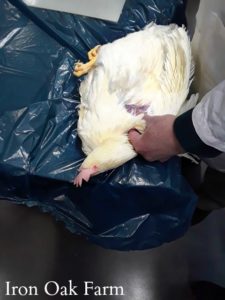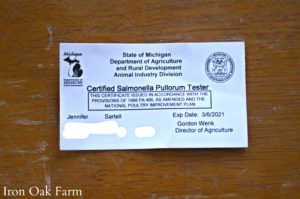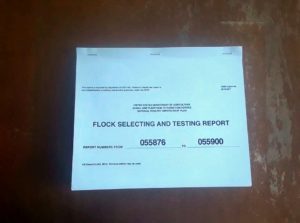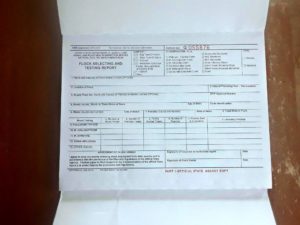 For this post I will use our home state of Michigan as an example. Each state has different rules and regulations, but this should give everyone a general idea of the process.
For this post I will use our home state of Michigan as an example. Each state has different rules and regulations, but this should give everyone a general idea of the process.
The pollorum test is a blood test. Usually the blood draw is taken from a vein under the wing. Only a drop of blood is needed and is mixed with a drop of pollorum antigen. After a few seconds (up to two minutes), a positive response will result in a coagulated look, where a negative result will stay mixed evenly.
If you would like to get your chicken flock NPIP certified, there area couple of ways you can go about doing this.
You can contact a Certified Pollorum Tester or you can become a Certified Tester yourself and test your own flock. In this post I will concentrate on how to find a tester, what the usual fees are, and how to get your certification.
Contact a Certified Pollorum tester
Where to find a tester?
 To find a certified tester visit the NPIP website. There should be a list of testers for your state. You can contact them and find out what their procedure is.
To find a certified tester visit the NPIP website. There should be a list of testers for your state. You can contact them and find out what their procedure is.
What does it cost?
When I was interested in getting our flock certified, I contacted several testers. Pricing on this service varies and is set by the individual. I found that a tester’s costs were anywhere from $100 to $300. Some testers have a charge for mileage and for each bird. Some charge a flat rate for a certain amount of distance then charge over and above that. The same goes for number of chickens. Some will charge a flat rate for a flock under a certain number of birds, then charge per bird above that. This fee does not include the certification cost from the state that you live.
Flocks less than 300 birds must test all birds, in flocks over 300 birds a minimum of 300 birds must be tested.
Certification Fee
In some states it’s free, in Michigan, unfortunately we are one of the highest, costing $300 for the first year and $125 for a renewal in years after that. For our flock to be tested and certified the first year, it was going to be anywhere from $400 to $600 when we combined the testers fee and the state certification fee. For some, this is enough to discourage backyard breeding practices altogether.
Another option is to become a certified tester yourself. You will have to pay for the initial learning course, and renewal of your certification, but I found that it was much cheaper to go this route. More on this in my next post.
 Once your flock has been tested, and a positive result has been found on all birds, you and the tester must complete the NPIP Veterinary Services (VS) 9-2 Form (Flock Testing and Selection).
Once your flock has been tested, and a positive result has been found on all birds, you and the tester must complete the NPIP Veterinary Services (VS) 9-2 Form (Flock Testing and Selection).
The completed 9-2 form and the initial site registration fee must be submitted to you state’s correct department. For Michigan it is the Michigan Allied Poultry Industry. They will process your request and be notified of your flock’s status and will receive a flock number from the national NPIP office.
 Once registered, you can ship birds for 1 year after they have been tested so long as you do not introduce any additional birds that have not been tested.
Once registered, you can ship birds for 1 year after they have been tested so long as you do not introduce any additional birds that have not been tested.
Once your flock is tested you will submit the results to your state department. This is done on the honor system. You do not send.











2 Comments
“Once your flock has been tested, and a POSITIVE result has been found on all birds,”. This means your birds have the disease. I think you mean “negative results” .
“Once your flock is tested you will submit the results to your state department. This is done on the honor system. You do not send.” How can you submit it if you do not send it in?
Nice article otherwise. Thanks.
In the NPIP testing article….you state “once all birds have tested positive….”
I think you meant to say “negative”?????